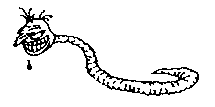Most of them didn't. Most of them ignored the plea from the operating system's designers to make the fix before someone broke into these computers through this weak area, called the "back door." There is no other word for this than incompetence. Those who think it's unlikely that most mainframe computer systems managers are incompetent - at least in this one area, if in no other - have their heads in the sand.
Think of it in terms of human viruses. If doctors throughout the country were warned of a potentially dangerous weakness in a major drug and most of them did nothing about it, how forgiving would we be? We would demand that the medical profession act immediately to remove those doctors who don't have enough sense to protect the public.
Are we going to do the same in regard to our systems managers?
I'm a realist. I know what the answer is. They'll go on protecting their jobs by making up excuses. They'll tell the people who hired them that the entire subject is too technical to explain, but they have the situation well in hand.
Bull. Every systems manager who ignored the warnings on the flaws in Unix, the operating system that Robert Morris sailed right through, should be fired.
It's as simple as that. It's time that we treated networked computer systems seriously. It's time that we stopped accepting the technobabble from these incompetents as something that no one else can comprehend. The rest of us can comprehend just fine, thank you.
If you agree, mail a copy of this column to your boss. Send a copy to the person who hires and fires the systems manager in your company or university.
How can computers catch a virus? It's easy. Keep in mind that a computer works quite a bit like a human being. Both need a central processor to run properly - a CPU chip in one case and a brain and central nervous system in the other. And both need the correct programs to work right - an operating system in the computer and an autonomous set of instructions to the organs of the body in the human. Each one can get sick when a virus works its way into the system and throws it off stride. In both the computer and the human, the virus hides itself and alters the day-to-day operations of its host. In its mildest form, the virus merely slows everything down. The computer responds sluggishly, and the human feels weak and rundown. At its worst, the virus can make either type of host so sick that it may not recover without intensive care. So far, what we have been describing also characterizes a simpler form of intruder, called a worm. The difference between a worm and a virus is that worms don't create new copies of themselves, but viruses do; in fact, the strongest viruses in computers and humans can create new clones of themselves many times a minute. The major conceptual difference is that human viruses are actual creatures, and they can sometimes be seen under a microscope. But computer viruses are formless groups of numbers written as a program. This may make them seem less harmful than human viruses, but it would be a serious mistake for us to treat them that way.
